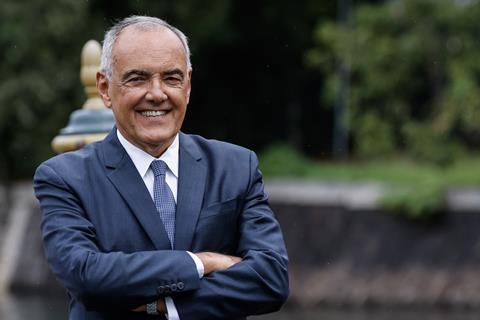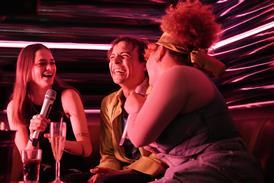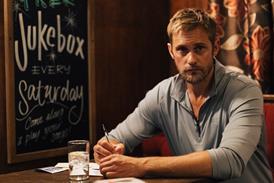
Venice artistic director Alberto Barbera unveiled the line-up for Venice Film Festival’s 81st edition today (July 23) with new films from Pedro Almodovar, Todd Phillips, Luca Guadagino, Pablo Larrain, Brady Corbet and Justin Kurzel.
Shortly after the line-up announcement, Barbera spoke to Screen about the return of eroticism in cinema, the absence of Netflix titles, the political nature of the selection and the number of stars coming to the Lido in 2024.
Casting your eye across the selection, are there any themes that particularly stand out this year?
There are some recurrent themes and topics. For example, the representation of sexuality. There is a return of eroticism in cinema which had been banned on the screen in recent years because of a predominant [attitude of] prudery. There are a lot of films dealing with sex – extreme sex as well – from sadomasochism to the relationship between men or between lesbians, which is good. It means there is less and less prejudice and [self] censorship from filmmakers.
Which films are you thinking about specifically?
I’m thinking about Babygirl with Nicole Kidman, Disclaimer by Alfonso Cuaron, Queer by Luca Guadagnino and the Norwegian film Love [by Dag Johan Haugerud]. They all deal with sexual relationships in our contemporary times.
There are a lot of coming-of-age films too that address the problems of younger people coming out of the pandemic, without any kind of perspective for the future, without fathers, without protection from the family, without any kind of reference that could help them to find a place in our society. For example, there is very nice French film in Competition called And Their Children After Them – by Ludovic and Zoran Boukherma – about teenagers in a remote area of France. In Horizons, there is The History Of Frank And Nina by Paola Randi, Nineteen by Giovanni Tortorici and Happyend, the Japanese film by Neo Soro.
Politics seems to be a big theme this year too.
There are a lot of films on the contemporary crises in our world – the war in Ukraine, the [Israel-Hamas conflict], climate change, immigration, the return of white supremacy in the US – that we have to face every day in the media. Cinema keeps on being the most effective way to think about the contemporary world and forces viewers to think about [issues] from a different perspective to the news.
Films such as Queer, Joker: Folie A Deux, Wolfs and The Brutalist were hotly tipped for selection this year. Are there any films that you have been pleasantly surprised to programme that were not on people’s radars?
In Competition, the film from Singapore [Stranger Eyes by Yeo Siew Hua]. It’s a second feature, but a very mature, multi-level film dealing with society under surveillance and about the state of families. It’s a very unexpected and brilliant, brilliant film.
The French film The Quiet Son by Delphine and Muriel Coulin is very interesting on contemporary problems. It’s a story of a father with two sons. One is very straightforward, and the other one is fascinated by extreme right movements and the violence of the neo-fascists in France.
Netflix has always been a big presence at the festival, but not so this year. Did they submit many films?
No, the problem is that they didn’t have strong films to submit for a festival this year because they were in a period of transition. Scott Stuber [Netflix’s former head of film] resigned at the end of last year. [His replacement] Dan Lin came only in the spring, so in this moment of transition there were no quality films to submit to a festival. But I know they will have a number of very strong author films for next year, so it is just temporary.
There is a right-wing government in power in Italy and the new president of the Biennale, Pietrangelo Buttafuoco, is from the right. Yet you have still selected films that address worries about the far right. Was it a challenge for you to include some of these films?
No, it was not a challenge. I could work in complete freedom of choice. I didn’t get any kind of pressure from anybody. I have an excellent relationship with the new president. He kept my freedom without any kind of interference. So I work in continuity with the past without any kind of problems, and that is good.
Last year the actors’s strike kept stars away, but this year it looks like a huge number are coming. Who will be here?
Everybody from the cast of the films will be here. And I am very happy about that. It will be the longest list of talents in the last 15 years or more. It’s quite impressive – all of them will be here from the first day: Michael Keaton, Winona Ryder and Monica Belluci [for opening film Beetlejuice Beetlejuice]. Then we’re going to have Cate Blanchett, Kevin Kline, Brad Pitt, George Clooney, Julianne Moore, Tilda Swinton, Daniel Craig and Lady Gaga.
It seems there are fewer films by controversial filmmakers here this year, like Roman Polanski or Woody Allen, who were programmed last year. Was that a deliberate choice?
No, absolutely not. I don’t care about the problems coming from controversial films. I didn’t in the past. I don’t have those kind of worries or concerns now. There could be some [controversy] concerning the political films of course, but nothing compared to the experience of the last few years.
Dani Rosenberg’s Horizon film Of Dogs And Men addresses the October 7 attack by Hamas. The issue of the Israel-Hamas war has been a big one for festival directors throughout the year, and there have been protests at many events. Does that concern you at Venice?
I heard about this film in the market in Berlin. It was still in production. It’s a sort of instant movie shot right after the attack by Hamas on the kibbutz in the beginning of October. We saw the film after Cannes. It’s a very good, balanced film… you really get the feeling that the filmmaker wants to show that war is insane, and that we only get pain and death from war. It is a very concerned film about the situation in Israel now. I hope there won’t be too many polemics about the film. It’s a film that asks the viewer to consider the tragedy of the war from every point of view.
It is the same for Amos Gitai’s out-of-competition film Why War and the two films about the Ukraine-Russian war. Since there are lot of filmmakers that are brave enough to face these problems, a film festival cannot avoid to take the responsibility to show the films and to take the risk of the polemics that occur. A festival is a place of discussion, of confrontation, and not – I hope – a chance for someone to start useless polemics.
There are plenty of very long films at the festival this year, and you are showing several series in full. Is it going to be difficult to schedule everything?
It is an issue. Films are getting longer and longer year after year. It is a sure trend of cinema today. As Steven Spielberg said in an interview a few months ago, the future of cinema is in series – it is not in the conventional form of film that we have been used to seeing.






















No comments yet